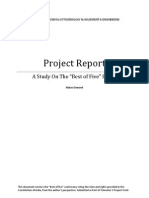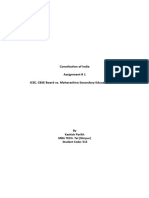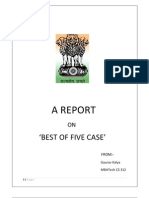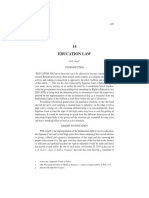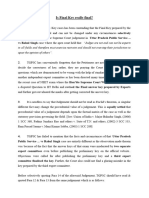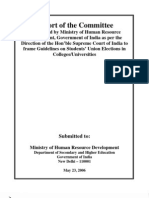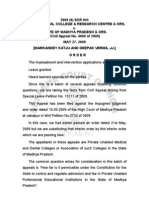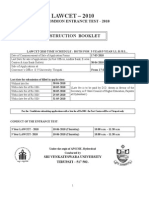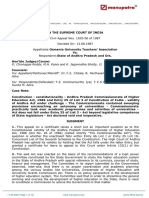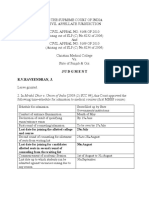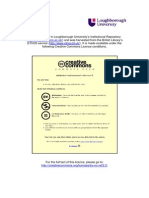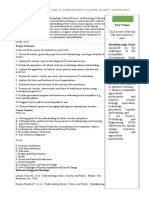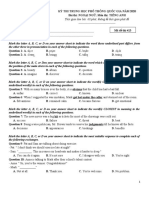COI - Assignment 1
COI - Assignment 1
Uploaded by
chelsea1989Copyright:
Available Formats
COI - Assignment 1
COI - Assignment 1
Uploaded by
chelsea1989Original Description:
Copyright
Available Formats
Share this document
Did you find this document useful?
Is this content inappropriate?
Copyright:
Available Formats
COI - Assignment 1
COI - Assignment 1
Uploaded by
chelsea1989Copyright:
Available Formats
2010
Constitution of India - Assignment 1
Deepak Ramkrishna Roll no. 114 MBA (Tech) IT - Mumbai
7/16/2010
Assignment 1
Assignment 1
My stand on the best five system introduced by the state for the admissions to junior colleges for SSC and ICSE students. A controversy has been playing out each year for the last three years prior to the commencement of the junior college admission process in Maharashtra. This year the controversy of best five subjects only for consideration for admission has been raging on for the past few months, finally getting resolved on 14 th July. With the SC passing a final verdict, the admission process is now set to start on 17 th July. The SC overruled the verdict of Bombay High Court. I wholeheartedly endorse the initial High Court verdict and oppose the final Supreme Court verdict. I am also vehemently opposed to the entire admission process, which I feel is blinkered, biased and is detrimental to the entire education system.
Background
1) Indian Certificate of Secondary Education (ICSE) The Indian Certificate of Secondary Education (ICSE) examination is an examination conducted by the Council for the Indian School Certificate Examinations for class 10, i.e., grade 10. Candidates appearing for the examination have to study seven subjects, with anywhere from 1 to 3 papers in each subject. The subjects allowed are: Group I: All subjects in this group are compulsory. English, History, Civics and Geography 1 combined History and Civics paper + 1 Geography paper and a second language 1 combined Literature and Language paper.
Group II: Though the students have a choice, it is generally assumed that they will take Mathematics and Science. Students wishing to take up other subjects must be apprised of the implications. They must study two subjects from this list:
Assignment 1
Mathematics, Science, Economics, Commercial Studies, Technical Drawing, Computer Science etc.
Group III: Any one of the following: Computer Applications, Economic Applications, Commercial Applications, Art, Physical Education etc.
2) CBSE CBSE students appear only for five exams and all will be considered for admissions 3) Secondary School Certificate Examination This exam is conducted by the State Government for Class 10. All students have to appear for six subjects including three languages viz. Marathi, English and Hindi. The state board has six compulsory subjects for class X students -- English and two languages, social studies, mathematics and science.
Assignment 1
Timeline of events
The entire controversy surrounding the admission procedure during the current year played out as follows The Maharashtra government came up with the best five formula. A government resolution said marks obtained in any five of the six subjects in Class 10 exams by an SSC student would be taken into account for admission to Class 11. An SSC pass-out, therefore, will be able to choose the five subjects in which he/she has excelled.
February 2010
June 2010
Several public interest litigations were filed by aggrieved parents of children who passed out from the Indian Certificate of Secondary Education (ICSE) board, asking why the same facility was not available to students of other boards.
High court struck down the 'best-five' system as it was 'discriminatory' and violates the fundamental right to equality
June 2010
State appeals against HC decision in SC
June 2010
July 2010
SC passes an interim order stating that the 'best-five' option should be extended to other boards as well. Final verdict expected in October
Assignment 1
My analysis of the entire saga
For the past three years, the State has been coming up with hare-brained ideas with regards to changing the admission procedure. The plans have been announced without any planning whatsoever (fundamental laws were violated) and without considering external factors. Moreover the rollout plan has been extremely shoddy. The state has failed to learn from its past experiences. 2009 90:10 controversy: On June 8th, the state announced the 90:10 system, which intended to set aside 90% junior college seats for SSC students. The system was struck down by Bombay High Court a month later. 2008 Percentile controversy: On June 27th, the state asked colleges to take a students percentages, divide by the average of the top ten from the board and multiply by hundred. The final percentile obtained would be used for admission. The state also attempted to resurrect a policy to keep 70% seats for students from the same district. The system was struck down by the HC in September. The state announces these plans just before admission begin every year. These plans lead to lengthy litigation, delaying the admissions and affecting the students. The state lacks foresight A government resolution said marks obtained in any five of the six subjects in Class 10 exams by an SSC student would be taken into account for admission to Class 11. An SSC pass-out, therefore, will be able to choose the five subjects in which he/she has excelled. On the contrary an ICSE student who has 7 subjects will not have the liberty to choose his/her best five subjects. This clearly violates Article 14 of the Constitution of India Article 14 - Equality before law - The State shall not deny to any person equality before the law or the equal protection of the laws within the territory of India. Several parents of ICSE students filed a case against the new system in the Bombay High Court claiming that their fundamental right to equality would be violated by the new system. Only 8289 students appeared for the ICSE examinations across Maharashtra, whereas 2.82 lakh students appeared for the SSC examinations. This attempt by the state to tilt the admission process in favor of the SSC students for the third year in a row indicates that the State is playing a political game and is trying to capture vote banks of SSC students relatives. Moreover the state passed a Government resolution rather than introducing a bill in the legislature again indicating its political motives. Throughout the State has claimed that SSC students are at a disadvantage during the admissions. However during the course of the trial in the HC and SC they were unable to substantiate this claim with any evidence. In fact the HC said that the system was
Assignment 1
intended to benefit SSC students under the garb of uniformity and that the sta te had miserably failed to substantiate that SSC students were suffering from a disadvantage in the admission process The Bombay High Courts verdict was to strike down the entire system and consider all marks for all Boards. This however meant that the State would have to reissue the certificates which indicated only the best five marks. To avoid this huge logistical overhead, the state appealed to the SC In my opinion, the High Court verdict truly upheld the essence of Article 14 by abolishing the system altogether and creating a level playing field. The Supreme Court verdict on the other hand was to extend the best -five system to the ICSE students as well. Although this upholds the right to equality, in my opinion, there are several flaws to this verdict o The entire system is faulty, as it encourages students to neglect one subject and concentrate on the his/her five best subjects o The verdict states that ICSE students cannot pick their best subject from Group III. If they wish to do so, all 7 subjects will be considered collectively. There are no such conditional clauses for SSC students, which is not fair. o It will also complicate the admission process immensely. For example can a student who wants to apply for science leave out science from his/her best five? o CBSE students are also at a disadvantage as they cannot choose their best subjects, thus lowering their overall percentage. The state has also failed to consider the fact that amidst all the controversy and litigation every year, it is the students, both from ICSE and SSC who suffer the most The admission process will now start by 19th June.
Conclusion
Though the Supreme Court verdict to extend the best-five system has brought relief to many and has in essence upheld Article 14, I feel that the verdict has been delivered hastily without sufficient deliberation and has in a way been affected by the short time period and logistical constraints such as re-printing of mark sheets. In my opinion, the High Court verdict to strike down the entire system was the best decision as it protects the rights of the students. The Supreme Court will pass a final verdict in October. I hope that the best -five system is abolished and that all students are treated equally during the admission process.
You might also like
- Group 3 - Freemark Abbey Winery Case AnalysisDocument7 pagesGroup 3 - Freemark Abbey Winery Case Analysischelsea1989100% (4)
- Group 3 - Freemark Abbey Winery Case AnalysisDocument7 pagesGroup 3 - Freemark Abbey Winery Case Analysischelsea1989100% (1)
- Islamic Academy of Education Vs State of KarnatakaDocument7 pagesIslamic Academy of Education Vs State of KarnatakaMayank YadavNo ratings yet
- Group 3 - Canonical (Eldorado Electronics)Document5 pagesGroup 3 - Canonical (Eldorado Electronics)chelsea1989No ratings yet
- Merck and Company: Evaluating A Drug Licensing OpportunityDocument9 pagesMerck and Company: Evaluating A Drug Licensing Opportunitychelsea1989No ratings yet
- Group 3 - Canonical (Eldorado Electronics)Document5 pagesGroup 3 - Canonical (Eldorado Electronics)chelsea1989No ratings yet
- Full Sentence OutlineDocument2 pagesFull Sentence Outlineapi-438480110100% (1)
- Chitralekha V State of Mysore - Case AnalysisDocument4 pagesChitralekha V State of Mysore - Case AnalysisRaushan KumarNo ratings yet
- Group 3 - Property Purchase StrategyDocument7 pagesGroup 3 - Property Purchase Strategychelsea198950% (2)
- Dharwar Drilling Society: Case Analysis ReportDocument8 pagesDharwar Drilling Society: Case Analysis Reportchelsea1989No ratings yet
- Coi Assignment 1Document4 pagesCoi Assignment 1Hardik ShahNo ratings yet
- Subject: Constitution of IndiaDocument6 pagesSubject: Constitution of IndiarahulsridharNo ratings yet
- Case Study Constitution FridayDocument14 pagesCase Study Constitution FridayShashwat SinghNo ratings yet
- COI AssignmentDocument9 pagesCOI AssignmentAbbas Dawood100% (1)
- Constitution of India Assignment # 1 ICSE, CBSE Board vs. Maharashtra Secondary Education BoardDocument7 pagesConstitution of India Assignment # 1 ICSE, CBSE Board vs. Maharashtra Secondary Education BoardKashish ParikhNo ratings yet
- Best of Five Case.Document8 pagesBest of Five Case.Gaurav KalyaNo ratings yet
- "All Students Are Equal": A Report On The Case of Best 5 Policy Under The TitleDocument8 pages"All Students Are Equal": A Report On The Case of Best 5 Policy Under The TitleNikhar OzaNo ratings yet
- Devasheesh Pathak CaseDocument6 pagesDevasheesh Pathak CaseJin KnoxvilleNo ratings yet
- 014 - Education Law 2015Document46 pages014 - Education Law 2015ishikaNo ratings yet
- Legal Education - ReportDocument4 pagesLegal Education - Reportfarhan col.valkyrieNo ratings yet
- 019 - Minority Educational Institutions (108-115)Document8 pages019 - Minority Educational Institutions (108-115)Som Dutt VyasNo ratings yet
- Is Final Key Really FinalDocument6 pagesIs Final Key Really FinalMende SureshNo ratings yet
- Manu/sc/0042/1969 Manu/sc/0025/1968 Manu/sc/0012/1955Document4 pagesManu/sc/0042/1969 Manu/sc/0025/1968 Manu/sc/0012/1955PrachiNo ratings yet
- A.M. Khanwilkar and Dinesh Maheshwari, JJDocument56 pagesA.M. Khanwilkar and Dinesh Maheshwari, JJayushNo ratings yet
- All About Symbiosis Entrance Test (Set) LawDocument11 pagesAll About Symbiosis Entrance Test (Set) LawNagababu SomuNo ratings yet
- Bar Exam Shamnad Basheer Letter To BCIDocument3 pagesBar Exam Shamnad Basheer Letter To BCIfaisal_calcuttaNo ratings yet
- CHRIST NATIONAL WRIT PETITION DRAFTING COMPETITION, 2021 - Akash KumarDocument36 pagesCHRIST NATIONAL WRIT PETITION DRAFTING COMPETITION, 2021 - Akash Kumarbhavyarathore2706No ratings yet
- Legal FrameworkDocument2 pagesLegal FrameworkVISHWAS RANANo ratings yet
- The Role of Judiciary in The Development of EducationDocument2 pagesThe Role of Judiciary in The Development of EducationKumar SpandanNo ratings yet
- Jaiveer Law On Education AssignmentDocument3 pagesJaiveer Law On Education AssignmentJaiNo ratings yet
- Lyngdoh Committee ReportDocument88 pagesLyngdoh Committee ReportSandeep MalkaniaNo ratings yet
- NEET: Proviso To Sec. 14 (1) of The NMC Act, 2019 Is UnconstitutionalDocument19 pagesNEET: Proviso To Sec. 14 (1) of The NMC Act, 2019 Is Unconstitutionalnadaraasan RNo ratings yet
- ImgsDocument12 pagesImgsMPprepg ReviewNo ratings yet
- Entrance Test For LL.M.: Jai Narain Vyas University, JodhpurDocument4 pagesEntrance Test For LL.M.: Jai Narain Vyas University, JodhpuradiNo ratings yet
- Prospectus: Maharashtra State Eligibility Test For Lectureship Conducted byDocument13 pagesProspectus: Maharashtra State Eligibility Test For Lectureship Conducted byrahoulk4u623No ratings yet
- Permanent Clat CommitteeDocument5 pagesPermanent Clat CommitteemohitNo ratings yet
- PIL or Contempt Petition For Stopping Deployment of Teachers in Non Teaching DutiesDocument2 pagesPIL or Contempt Petition For Stopping Deployment of Teachers in Non Teaching DutiesOliullah LaskarNo ratings yet
- Saumya Tiwari Vs State of UDocument28 pagesSaumya Tiwari Vs State of UHarshita SinghNo ratings yet
- Case Laws AJay Hasiya V Khalid MujabDocument7 pagesCase Laws AJay Hasiya V Khalid MujabDeepak BishnoiNo ratings yet
- GORT42 2010 A.p.educationDocument5 pagesGORT42 2010 A.p.educationPandurrNo ratings yet
- LAWCET - 2010: Instruction BookletDocument12 pagesLAWCET - 2010: Instruction BookletphanikumarspkNo ratings yet
- Anti Clat Writ PetitionDocument848 pagesAnti Clat Writ Petitionranjanjhallb100% (1)
- No Poll Duty For UnaiDocument2 pagesNo Poll Duty For UnaiPrincipal GMVITNo ratings yet
- TNTET Latest InstructionsDocument54 pagesTNTET Latest InstructionsAMU SHAHUL HAMEEDNo ratings yet
- P.A. Inamdar Vs State of MaharashtraDocument9 pagesP.A. Inamdar Vs State of MaharashtraArmaan Singh100% (1)
- SC Judgement That A Deemed University Cannot Offer Degrees Not Specified by The UGCDocument29 pagesSC Judgement That A Deemed University Cannot Offer Degrees Not Specified by The UGCLatest Laws Team100% (1)
- Constitional Law I - BBALLB 2013 & LLB 2014Document3 pagesConstitional Law I - BBALLB 2013 & LLB 2014DiyaNo ratings yet
- Cbse Board Sample Papers For PhysicsDocument3 pagesCbse Board Sample Papers For Physicsapi-139761950No ratings yet
- Supreme Court Puts On Hold Results of Karnataka Board Exams For Classes 5,8,9 & 11 Says State Playing With Students' FutureDocument4 pagesSupreme Court Puts On Hold Results of Karnataka Board Exams For Classes 5,8,9 & 11 Says State Playing With Students' FutureRazik MuahmmedNo ratings yet
- TNTET Sup Exam Latest Instructions MaterialDocument54 pagesTNTET Sup Exam Latest Instructions Materialedwin_prakash750% (1)
- Principal, Kendriya Vidyalaya & ... Vs Saurabh Chaudhary & Ors On 5 November, 2008Document7 pagesPrincipal, Kendriya Vidyalaya & ... Vs Saurabh Chaudhary & Ors On 5 November, 2008prof_ktNo ratings yet
- Prospectus: Maharashtra State Eligibility Test For Lectureship Conducted byDocument13 pagesProspectus: Maharashtra State Eligibility Test For Lectureship Conducted bysanttoNo ratings yet
- Gujarat Board SyllabusDocument3 pagesGujarat Board Syllabusapi-139761950No ratings yet
- Osmania University Teachers Association Vs State os870126COM806344Document10 pagesOsmania University Teachers Association Vs State os870126COM806344Rajeev SharmaNo ratings yet
- Case CommentsDocument11 pagesCase CommentsDivya SinghNo ratings yet
- Institute of Physics: WWW - Iopb.res - inDocument7 pagesInstitute of Physics: WWW - Iopb.res - inJeshiNo ratings yet
- Evolution of Right To Education in The Last DecadeDocument5 pagesEvolution of Right To Education in The Last DecadeNaveedNo ratings yet
- LL.B. 3 Yr 2015 SyllabusDocument96 pagesLL.B. 3 Yr 2015 SyllabusSagarNo ratings yet
- Surpeme Court Judgment On Ragging - 2009Document23 pagesSurpeme Court Judgment On Ragging - 2009Latest Laws TeamNo ratings yet
- Christian Medical CollegeDocument5 pagesChristian Medical CollegeAnil chaudharyNo ratings yet
- Constitutional Law II.Document3 pagesConstitutional Law II.Chenna ReddyNo ratings yet
- Admin Moot Issue 3Document3 pagesAdmin Moot Issue 3Levisha SinglaNo ratings yet
- Ne&slet, SetDocument33 pagesNe&slet, SetUthaya Kumar100% (1)
- Writ Petition CMR College of Engineering & ... Vs The Jawaharlal Nehru ... On 28 July, 2016Document15 pagesWrit Petition CMR College of Engineering & ... Vs The Jawaharlal Nehru ... On 28 July, 2016Krishna PrasadNo ratings yet
- Secondary School Certificate Board (SSC)Document11 pagesSecondary School Certificate Board (SSC)Jigna Khoyani0% (1)
- Bihar High Court Relaxation Tet Case JudgementDocument4 pagesBihar High Court Relaxation Tet Case JudgementVIJAY KUMAR HEERNo ratings yet
- Bapi Kandar and Others Vs The State of West Bengal and Others On 27 July 2018Document7 pagesBapi Kandar and Others Vs The State of West Bengal and Others On 27 July 2018pritamleomessi10No ratings yet
- DX 090000Document510 pagesDX 090000chelsea1989No ratings yet
- AbcdeDocument296 pagesAbcdechelsea1989No ratings yet
- Group 6 - Fret and Regret Can Nse AnalysisDocument6 pagesGroup 6 - Fret and Regret Can Nse Analysischelsea1989No ratings yet
- Efficient Capital MarketsDocument55 pagesEfficient Capital MarketsaasisranjanNo ratings yet
- Bonds: (Pakistan) (00923013791119)Document31 pagesBonds: (Pakistan) (00923013791119)chelsea1989No ratings yet
- Constitution of India: Analysis OnDocument9 pagesConstitution of India: Analysis Onchelsea1989No ratings yet
- Derivative StrategiesDocument32 pagesDerivative Strategieschelsea1989No ratings yet
- EthioDocument11 pagesEthiohundeeNo ratings yet
- Facebook Usage - Research 2Document27 pagesFacebook Usage - Research 2Alba, Lenard S.No ratings yet
- POM A1.1 BriefDocument5 pagesPOM A1.1 BriefLuna LeeNo ratings yet
- Weebly Section 1Document5 pagesWeebly Section 1api-487421290No ratings yet
- Thesis Entitled "Degree of Competency of Nursing Students in The Implementation of Ethical Guidelines For Nursing Practice"Document43 pagesThesis Entitled "Degree of Competency of Nursing Students in The Implementation of Ethical Guidelines For Nursing Practice"Saro BalberanNo ratings yet
- Hypnotherapy in MedicineDocument551 pagesHypnotherapy in MedicineOVVCMOULI100% (4)
- Core 13 UcspDocument3 pagesCore 13 UcspJanice DomingoNo ratings yet
- Use of Science KitDocument11 pagesUse of Science KitrehmatNo ratings yet
- 8° Basico Test 1Document3 pages8° Basico Test 1Jorge Andres Jimenez A.No ratings yet
- IQ Test. No Obligations, Free Online IQ Test atDocument7 pagesIQ Test. No Obligations, Free Online IQ Test atRocky MontañerNo ratings yet
- English File - Elem - 10BDocument2 pagesEnglish File - Elem - 10BCarlos LlanasNo ratings yet
- Alumni Spotlight Presidents Address Presidents Address: by Darren MillsDocument3 pagesAlumni Spotlight Presidents Address Presidents Address: by Darren MillsDarren MillsNo ratings yet
- Physics 2010 WaecDocument10 pagesPhysics 2010 WaectimothyNo ratings yet
- IdeiaDocument8 pagesIdeiaapi-306929216No ratings yet
- Project Planning Kids ArtDocument5 pagesProject Planning Kids ArtalygabriyelNo ratings yet
- School Based INSET Completion ReportDocument19 pagesSchool Based INSET Completion ReportimkeyaaahNo ratings yet
- Academic Vocabulary Set 01 Unit1:Learn To Succeed: Words IPA Meaning and Example AdolescenceDocument4 pagesAcademic Vocabulary Set 01 Unit1:Learn To Succeed: Words IPA Meaning and Example AdolescenceTrung TrầnNo ratings yet
- G11 TG EngDocument246 pagesG11 TG EngMohd shayaanNo ratings yet
- 2013-2014 Student AUP FormDocument2 pages2013-2014 Student AUP FormAngie KruzichNo ratings yet
- Financial Research PapersDocument8 pagesFinancial Research Papersc9rvcwhf100% (1)
- English q4w7d2Document6 pagesEnglish q4w7d2Jo MarNo ratings yet
- Michael E. BernardDocument17 pagesMichael E. BernardAvneet kaur KaurNo ratings yet
- (Đề thi có 05 trang) Thời gian làm bài: 60 phút, không kể thời gian phát đềDocument6 pages(Đề thi có 05 trang) Thời gian làm bài: 60 phút, không kể thời gian phát đềNguyen Dinh Nam (K17 HL)No ratings yet
- HSC Chemistry Full Question Bank Solutions PDF - CompressedDocument193 pagesHSC Chemistry Full Question Bank Solutions PDF - CompresseddahaleswaroopNo ratings yet
- Teacher Performance Evaluation HandbookDocument54 pagesTeacher Performance Evaluation HandbookCut LatifahNo ratings yet
- Guidelines in Writing An Action ResearchDocument19 pagesGuidelines in Writing An Action Researchcerelina mestiolaNo ratings yet
- Case Studies PresbyopiaDocument33 pagesCase Studies PresbyopiaMalaika Zubair100% (1)
- 2025 - Excerpt (11-17 )Document28 pages2025 - Excerpt (11-17 )안하준No ratings yet
- Group Decision MakingDocument16 pagesGroup Decision MakingMonir H. Mazumder100% (1)












